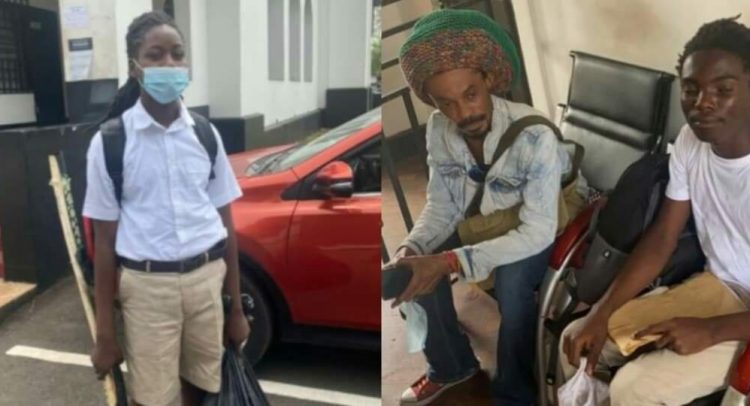It is however important to note that while these fundamental freedoms are enshrined in the Constitution, the Constitution also strongly provides for the protection of personal liberty of children. In Article 14 (1) (e) the law states that:
“(1) Every person shall be entitled to his personal liberty and no person shall be deprived of his personal liberty except in the following cases and in accordance with procedure permitted by law –
(e) for the purpose of the education or welfare of a person who has not attained the age of eighteen years; or”
The law expressly provides that while every person is entitled to his personal liberty, children (persons less than 18 years) may be deprived of their personal liberty for the purpose of their education or welfare.
This provision clearly accounts for the reason why parents, for instance, in ensuring the welfare of their children, may restrict the children’s freedom of
movement and some other freedoms enshrined in the Constitution.
In the senior high schools for example, by reason of this provision, the students are obliged to apply for exeats/absits (which may be approved or denied by the school authority) before a student can freely move out of school. Students are made to sleep at a particular time, eat at a particular time etc.
This means that while a person may have rights; such liberties of the person may be deprived for the purpose of their education or welfare as stated in the Constitution.
To this end, the schools as a training institution have regulations aimed at providing for the welfare, training and instilling discipline among the students.
Absolute Rights
It must be pointed out strongly that International Human Rights Law identifies some rights as absolute while other rights may have some reasonable limits placed on them.
Rights may be distinguished as either derogable or non-derogable. The International Covenant on Civil and Political Rights (ICCPR) provides for a derogation power in Article 4 which permits governments to provisionally suspend the application of certain rights in exceptional circumstances of ‘state of emergency’ and other situations.
In Ghana, for instance, we recently witnessed the imposition of restriction of movement in the heat of the COVID-19 pandemic.
Non-derogable rights such as right to life, freedom from slavery and servitude, freedom from torture or cruel, inhuman and degrading treatment or punishment; freedom of thought, conscience and religion may either be absolute or non-absolute. Even though non-derogable rights cannot be suspended, the ICCPR provides for some limitations in their application.
The right to freedom of religion for instance in Article 18 of the ICCPR is non-derogable. However, in article 4(2) which states:
“No derogation from articles 6, 7, 8 (paragraphs 1 and 2), 11, 15, 16 and 18 may be made under this provision.”
It may be subject to limitations in accordance with Article 18(3)
“Freedom to manifest one’s religion or beliefs may be subject only to such limitations as are prescribed by law and are necessary to protect public safety, order, health, or morals or the fundamental rights and freedoms of others.”
Same can be said about Article 6 which deals with the right to life. It must be noted that some necessary, reasonable and proportionate circumstances may justify the taking of someone’s life. (www.ag.gov.au)
Jamaican Case
In Jamaica, where Rastafarianism developed, the Supreme Court in a recent case of Dale Virgo and ZV v Board of Management of Kensington Primary School, Minister of Education and Attorney General of Jamaica [2020] JMFC in a unanimous decision held that a school policy prohibiting dreadlocks as a hairstyle does not violate constitutional rights, including to self-expression, of the child.
The parents of a minor child were informed by the school that unless they cut the child’s locked hair her admission to the school would be revoked because the school had a policy of “no braids, no beads, no locking of hair.”
In paragraph 155 of the judgment, the COUli declared that an individual cannot vary the rules of an institution simply because it does “not fit in with their choices and mode of self-expression”. The court held that the school’s policy of “no braids, no beads, no locking of hair” was not an infringement of the child’s right to freedom of expression.
It must be pointed out that there is an exception in Jamaica law to the policy on the grounds of religion, which the parents failed to disclose to the school. The case was therefore not about the right of Rastafarian children to wear dreadlocks to school.
Under section 17 (4) on the protection of freedom of religion in the Jamaica Constitution 1962 with Amendments through 2015, the law unequivocally provides that:
“No person attending any place of education, except with his own consent (or, if he is a minor, the consent of his parent or guardian) shall be required to receive religious instruction, or to take part in or attend any religious ceremony or observance, which relates to a religion or religious body or denomination other than his own.”
Undoubtedly, in Jamaica, the rights of a child regarding religious liberty at any level of education is allowed and not deprived. The case is not entirely the same in Ghana.
In my view, some rights which are non-derogable can be limited. While the relevance of the policy on a child’s hairstyle etc. may be a subject of further discussion, Achimota School’s policy to disallow the Rastafarian minor students to wear dreadlocks does not infringe on the rights of the students.
As much as has been the practice of schools being to a large extent tolerating religious rights, these liberties must conform to the regulations of the respective schools.
The regulations in my opinion must take cognizance of the Constitution and should not unreasonably be at variance with relevant laws. This position is fortified by Article 14 (1) (e) which deprives a child his personal liberty for the purpose of education or welfare.
By Harold Boateng

